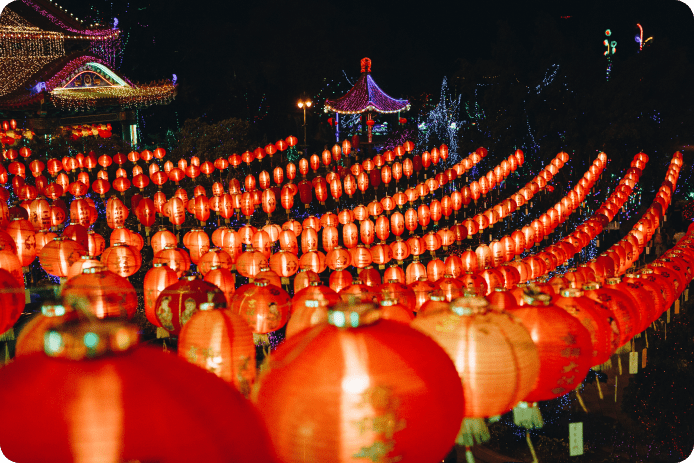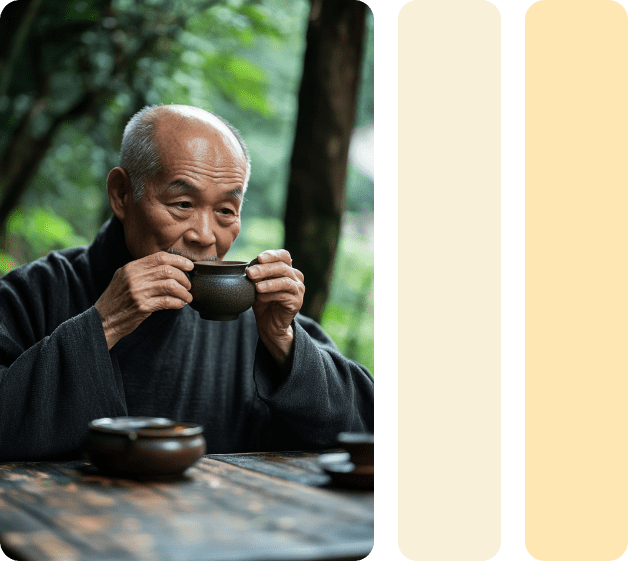Cherish and enrich ancestors and past loved ones
The Zhongyuan Jie Festival
The Zhongyuan Jie (中元节), or as it is affectionately known as the Hungry Ghost Festival, has deep spiritual and religious roots in Chinese culture.

HISTORY
The History of Zhong Yuan Jie
Primarily followed by Chinese Buddhists and Taoists the tradition dates back to the Tang Dynasty (618-907 AD), when it was believed that the spirits of the dead needed to be appeased to avoid causing trouble or harm to the living. Since then the festival has evolved into the significant event enjoyed by millions across Mainland Chine, Hong Kong, Macau and Taiwan, as well as many other Asian regions such as Singapore, Malaysia, Thailand, Cambodia and Indonesia.
Blending elements of Buddhist and Taoist practices they believe that during this time, known as the “seventh month” or 七月 (“seventh month” in Chinese), the gates of Hell are opened, releasing spirits who roam the earth.

TRADITION
The Tradition of Joss Paper
The tradition in Singapore and other regions, the Hungry Ghost Festival is observed throughout the seventh lunar month, typically in August. During this period, people make offerings to ancestors and wandering spirits, believing that the gates of hell open for spirits to return. Rituals include burning joss paper, offering food, and performing traditional acts called geta to entertain both the living and spirits.
Within China, the festival is called Zhongyuan Festival, marked by elaborate ceremonies to appease spirits and ensure good fortune. It emphasizes ancestor worship and community gatherings. In Thailand, it is known as Sat Thai, while in Cambodia, it is called Pchum Ben.
These festivals share the theme of honouring ancestors and deceased loved ones, ensuring their well-being in the afterlife. Zhong Yuan Jie is a longstanding tradition highlighting family, community, and connections between the living and the dead across Asian cultures.
The seventh lunar month, known as Tishri in the lunar calendar, was historically called Ethanim. In Leviticus 23:23–25, the first of Tishri marks the new year, and the 10th day marks the Day of Atonement.
Simillar Festival
Similar to the Qingming Festival, burning joss paper during the Zhongyuan Festival is deeply symbolic. Paper crafted into money, houses, luxury items like branded goods, or even a Rolex watch symbolizes cherishing and enriching ancestors in the afterlife. It represents life’s continuity and the ongoing connection between the living and the dead.
The rising smoke is believed to carry prayers to ancestors, reinforcing familial love and respect. Ancestors, though no longer part of the physical world, are believed to guide, bless, and protect their living descendants.
BURNING JOSS PAPER
Burning Joss Paper During the Zhongyuan Festival
Burning joss paper during the Zhongyuan Jie festival is not merely a ritual but a deeply spiritual practice. It symbolizes bridging the material world and the spiritual realm. The tradition of burning joss paper, rooted in Taoist and Buddhist customs, dates back over 2,000 years. This act serves as a tangible link between the living and their ancestors, reinforcing their bond.
When joss paper burns, it is believed to transform into a spiritual currency that the deceased can use in the afterlife. Offering these items provides comfort, wealth, and blessings to the spirits, ensuring their well-being. Ancestors are thought to receive these offerings with gratitude, allowing them to enjoy a comfortable existence in the spiritual world. The more generous the offering, the better the circumstances for the deceased, highlighting the living’s responsibility to care for their ancestors, even after death.
The Tradition
This enduring tradition embodies filial piety and respect for one’s forebears, emphasizing love, reverence, and remembrance. Spiritually, burning joss paper purifies and transforms material offerings into ethereal energy. The rising smoke is believed to carry the prayers and messages of the living to their ancestors, fostering a connection between the two realms.
During this ritual, the boundaries between the physical and spiritual worlds blur, enabling a harmonious exchange of energy and blessings. The practice transcends the material world, bringing comfort to ancestors, ensuring their afterlife well-being, and strengthening bonds between the living and the dead. It fosters a sense of continuity and shared heritage across generations.
DOWNLOAD THE APP
Download the app for free
Treasure me is a free, digital joss paper platform (app) available on your android & apple phone.

